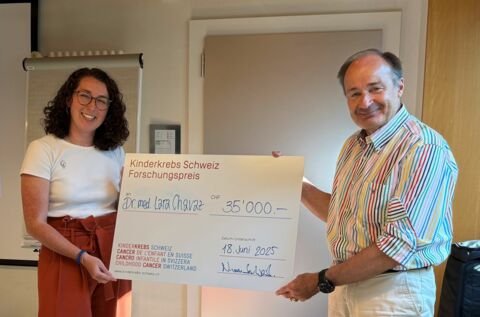
Official award ceremony in Bern
The official award ceremony took place in Bern on 18 June 2025. This year’s award, endowed with CHF 35,000, went to Lara Chavaz from Geneva University Hospital who researches the long-term effects of specific therapies that are frequently used to treat cancer but can lead to hearing loss in young patients.
With this annual award, the umbrella organisation honours young scientists who engage in outstanding and pioneering projects in basic research at Swiss research institutes or hospitals. Childhood Cancer Switzerland conducted an interview with Lara Chavaz about her research project.
Mrs Chavaz, what exactly is your research project about?
Thanks to research, we can now cure four out of five children, but unfortunately, in many cases the treatments also lead to long-term health complications. Damage to the hearing, or more precisely the inner ear, is one of them. Platinum-containing chemotherapeutic agents in particular, which are very effective in the treatment of liver, bone and other solid cancers, can irreversibly damage the sensory cells of the inner ear. For example, cisplatin, the most commonly used platinum-based chemotherapy in paediatric cancer treatment, leads to hearing loss in one in three patients. With the findings from our research project, which is co-financed by Childhood Cancer Switzerland as well as by the CANSERCH foundation, we want to help improve treatments in the future and minimise these types of late effects.
Which children have a particularly high risk of treatment-related hearing loss?
The younger the affected children are and the higher the dose administered, the greater the risk of them suffering hearing loss. Although there are ways of replacing cisplatin with less toxic chemotherapeutic agents or administering preventive medication, it is unclear whether these alternative therapies are equally effective. Therefore, cisplatin is still among the chemotherapeutic agent of first choice. Other chemotherapies such as vincristine, which are often administered together with cisplatin, can also affect hearing. We know that these two substances can successfully eliminate cancer cells, but we do not know why they so often permanently damage the inner ear cells. Recent studies suggest that the interaction of the two drugs could lead to greater toxicity. We are therefore investigating the cellular mechanisms involved in this in the laboratory. Only a precise understanding of these fundamental processes will make it possible to identify high-risk patients, take preventive measures and develop drugs that can protect against hearing loss.
Why is research into late effects so important?
Paediatric cancer medicine has made immense progress in recent decades. Fortunately, more and more patients are surviving the disease, but most of them struggle with late effects afterwards. Some less, others more. While research used to focus on finding a cure, the quality of life is increasingly taking centre stage as the number of childhood cancer survivors rises. This is also where our research project comes in. The effects of therapy-related and irreversible late effects on hearing vary greatly from person to person. In general, however, it can be said that the younger a child is, the more difficult it is to recognise a hearing impairment and the more serious its impact on their development can be. This includes, for example, problems with language acquisition, school performance and social skills. We should therefore do everything we can to move towards a tailor-made therapeutic approach that successfully combat the cancer while minimising the long-term health consequences.
What motivates you most in your work and why basic research?
After my medical studies, I worked as a junior doctor in paediatrics and became interested in oncology and late effects. There I realised that although most children are cured, they usually have to struggle with long-term health problems afterwards. I also volunteer for an organisation that looks after survivors, i.e. young people who were diagnosed with cancer as children or adolescents. Here, too, it becomes clear that life after the illness is different due to the late effects. I am grateful for all these experiences because they show how important it is that paediatric cancer medicine continues to make progress in terms of quality of life. Basic research helps us to do this. It enables a better understanding of the cellular and molecular mechanisms that come into play in cancer therapy. With this knowledge, treatment approaches can be optimized to minimize or even eliminate late effects, giving children with cancer every chance to grow into healthy adults.